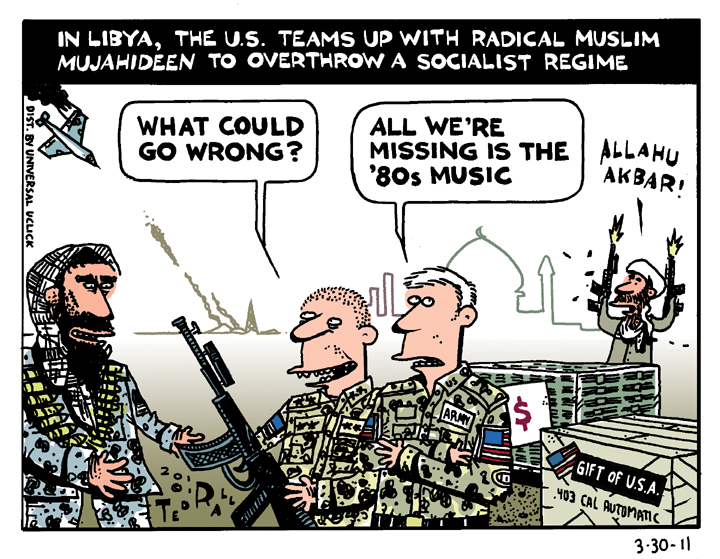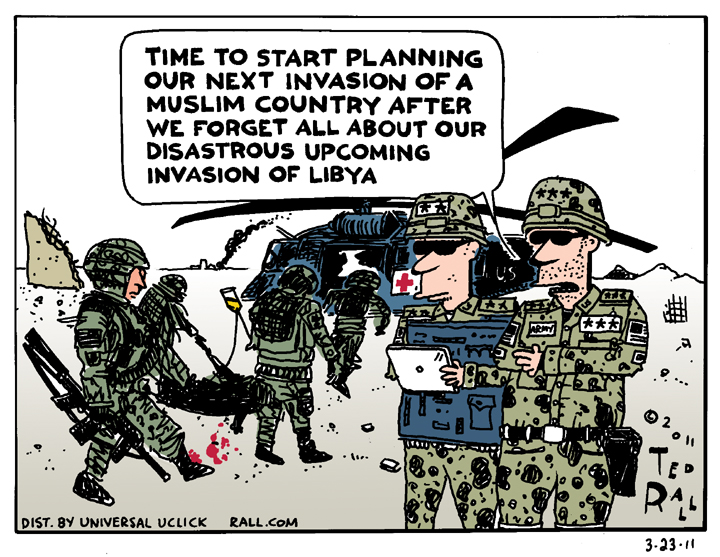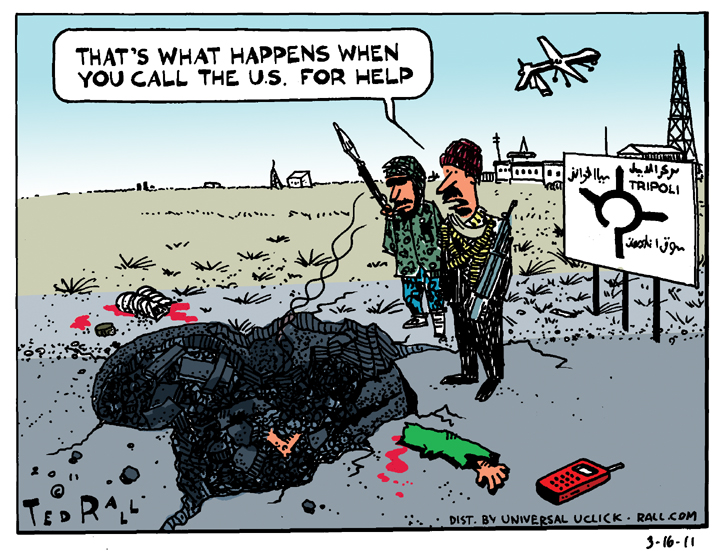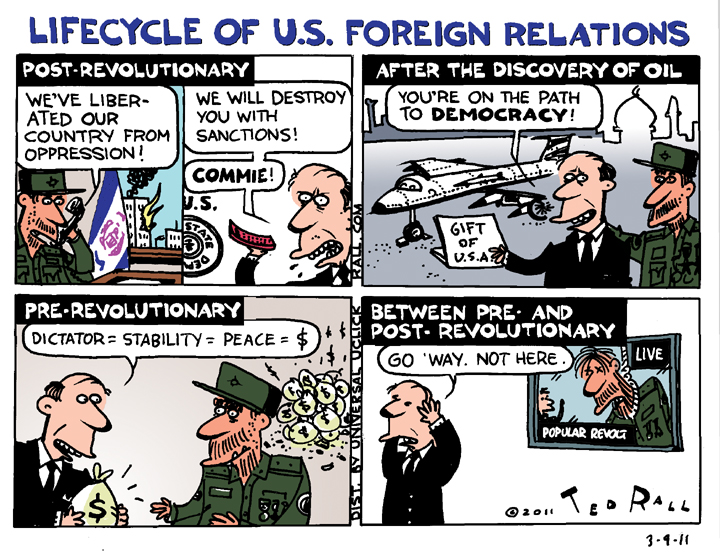Who Are the Libyan Opposition?
Hi. You don’t know me. See that big guy over at the bar? I’m going to pick a fight with him. Wanna back me up?
That’s what we, the American people, are being asked to do in Libya. We’re not picking sides. Picking sides implies that we know what’s going on. We don’t.
Give George W. Bush this: he respected us enough to lie us into war. Obama wants us sign a blank check, no questions asked.
“We do not have any information about specific individuals from any organization that are part of this [war],” Hillary Clinton said on “Meet the Press.”
“But of course, we are still getting to know the people [rebels] leading the Transitional National Council [TNC].”
“Of course.”
This was over a week into the war.
I don’t know what’s more frightening. That Secretary of State Clinton expects us to believe that the U.S. government is fighting, spending, killing—and soon, inevitably, dying—for a cause it doesn’t know anything about? Or that she may be telling the truth.
For all we know the Libyan TNC, also known as the National Conference of the Libyan Opposition, is composed of and led by noble, well-intentioned, freedom-minded people everyone can get behind. But that’s the point: we don’t know.
Obama’s defenders say he’s different than Bush. Look! No cowboy talk! He got an international coalition! Even the French are on board!
Big deal. Hitler had a coalition too. Which also included the French.
Remember how, after 9/11, we got a history lesson about Afghanistan? Remember “blowback”? Remember how Al Qaeda came out of the anti-Soviet jihad of the 1980s? How, if it hadn’t been for the U.S. and its CIA, Osama bin Laden would today be working for his dad’s real estate development business in Saudi Arabia? The last thing U.S. policymakers should want to do now is replicate the 1990s, when they had to tramp through the Hindu Kush, buying back Stinger missiles from the Taliban.
Incredibly, in Libya today, the U.S. may be crawling back into bed with a bunch of crazy Islamists.
Who are the Libyan opposition? We have few clues. From what we can tell, the TNC is apparently a peculiar alliance of convenience between monarchists and Islamists.
One TNC leader is the pretender to the throne. The TNC uses the flag of the former kingdom deposed by Kadafi.
Western media outlets ridiculed the Libyan dictator for blaming unrest on Al Qaeda. On February 25th CNN’s Paul Cruickshank reflected this official line: “Militant Islamists have played almost no role in the uprisings in Libya.”
How much changes in a month.
As bombs were raining down on Tripoli, military officials began to concede an open secret: eastern Libya has long been a hotbed for Muslim extremism. “Al Qaeda in that part of the country is obviously an issue,” a senior Obama official told the New York Times on condition of anonymity. NATO military commander Admiral James Stavridis admitted to a Senate hearing that there were “flickers” of foreign fighters affiliated with Al Qaeda and Hezbollah presence among anti-Kadafi insurgents.
Constitutionalists to return to the Founders’ original intent. They say Congress, not the president, ought to decide whether or not to go to unleash the military. Obama didn’t even bother to get the usual congressional rubber stamp for this latest invasion.
But never mind Congress. War should be voted upon by the citizenry. After all, we—not Congress—bear the costs. If a president can’t be bothered to explain why we should kill and be killed and spend billions of dollars on a conflict, too bad for him and his pet defense contractors.
Starting with Obama’s carefully calculated conflation of civilians and insurgents, everything about Obama’s Libyan war stinks. The U.N. has authorized military operations to protect “civilians.” How, no matter how likeable they are, do Libyan rebels armed with anti-aircraft guns qualify as civilians?
As does this nightmare of a president’s what-if scaremongering, so reminiscent of Bush during the run-up to the 2003 attack on Iraq. What if there are massacres? But there weren’t any. What’s next—WMDs?
Hillary cites Kadafi’s “history and the potential for the disruption and instability” as casus belli. Funny, Moammar’s history didn’t bother her in 2009 or 2010—when her State Department had full diplomatic relations with his regime. As for the “potential” of “disruption and instability”—aw, hell, that could happen anywhere. Even here.
“If Jeffersonian Democrats take over in Libya, he’s a hero,” Robert Borosage of the Campaign for America’s Future said of Obama. “If he gets stuck in an ongoing civil war, then it could be enormously costly to the country, and to him politically.”
Which outcome would you bet on?
(Ted Rall is the author of “The Anti-American Manifesto.” His website is tedrall.com.)
COPYRIGHT 2011 TED RALL




